Alexander 2.8
Alexander the Great (*356; r. 336-323): the Macedonian king who defeated his Persian colleague Darius III Codomannus and conquered the Achaemenid Empire. During his campaigns, Alexander visited a.o. Egypt, Babylonia, Persis, Media, Bactria, the Punjab, and the valley of the Indus. In the second half of his reign, he had to find a way to rule his newly conquered countries. Therefore, he made Babylon his capital and introduced the oriental court ceremonial, which caused great tensions with his Macedonian and Greek officers.
Son of Ammon
To Egypt
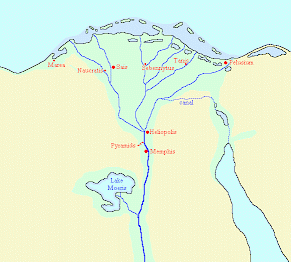
In December 332, the Macedonian army and navy reached Pelusium (modern Port Said). Here, Alexander was met by the Persian satrap Mazaces and an official named Amminapes, who surrendered the country. Mazaces may have wanted to behave a bit more heroic, but he had no troops - they had been destroyed in the battle near Issus - and knew that in the event of war, he would have to face both the invader and the native population, which had revolted very recently (in 338-336). Amminapes may have had an agenda of his own: he had lived in Macedonia and knew the conqueror. He was to be rewarded two years later (below).
The future government of Egypt was to be divided over several persons. An Egyptian and an Iranian, Petesis and Doloaspis, were to lead the civil administration. At least eight military commanders had to serve under two Macedonian officers named Balacrus and Peucestas. A third officer was appointed as admiral, Polemon.
Alexander left a garrison at Pelusium, ordered his navy to occupy the Egyptian capital Memphis and led his army to Heliopolis (north of modern Cairo). This was one of the most important places in Egypt's religious life: here was the temple of Ra, the sun god who protected the pharaoh. It was perhaps in this city that Alexander accepted the titles of the Egyptian ruler. From now on, the priests wrote about him as the Horus, the protector of Egypt; king of Upper and Lower Egypt; beloved by Amun; the chosen one of Ra; the son of Ra, Alexander. There is no reliable evidence for a coronation ceremony.
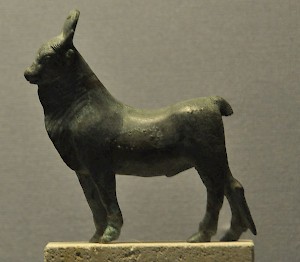
The new lord of Egypt continued to Memphis, where he sacrificed to the Apis, a manifestation of the Egyptian god Ptah. Although our sources do not mention it, we can be confident that he paid a visit to the pyramids at Giza. Everywhere, the Macedonians were greeted as liberators. Which in fact they were: the Persians had occupied Egypt from 525 to 404 and had reconquered their former possession in 343, only eleven years before. The Egyptians still remembered their former freedom, an idea that Alexander knew how to use for his own benefit.
Alexandria
The Macedonians went on along the Nile to the northwest, passed the old Greek ports of trade Naucratis and Marea, and reached the Mediterranean again. In January 331, Alexander decided to found a new town on the western mouth of the Nile, which was to be called Alexandria. The actual founding ceremony took place on 7 April (text). In fact, it was not a completely new foundation: archaeologists have discovered older walls and we know its old name, Rhacotis, from literary sources.
As always, Alexander had several motives to found a new city. He may have been happy that he could leave behind his wounded and his veterans, who could begin a second life. Many Greek emigrants came to the new city. But Alexandria was to be more than just a settlement for veterans and immigrants: its location in the northwest of Egypt strongly suggests that the founder of the city wanted to open a trade route to the Aegean sea. As such, it was to be one of his greatest and most lasting successes.
Ammon

Some 400 kilometers to the west lay the Siwa oasis, which was famous for its oracle of Ammon, a god whose cult had been propagated in Greece by the poet Pindar. He had been the first Greek to dedicate an ode to the god and one of the first to erect a statue to the god. Alexander must have known the shrine of Zeus Ammon in the Macedonian town Aphytis, and it is perhaps not too far-fetched to assume that Alexander spared the house of Pindar (above) because of the statue. On the other hand, there is no evidence that Alexander worshipped the ram-god before he visited Siwa in March 331.
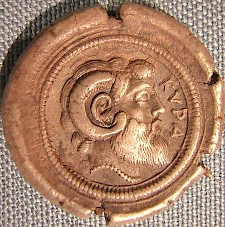
According to Arrian's story, Alexander visited the oracle because he wanted to imitate his legendary ancestors Perseus and Heracles. This is an odd couple: Perseus never played an important role in Alexander's propaganda. However, since the fifth century, Perseus was regarded as the ancestor of the Achaemenids, the Persian royal house; and everybody knew that the Macedonian kings descended from Heracles. Following the footsteps of Heracles and Perseus was therefore, in a sense, a religious preliminary to the conquest of the Achaemenid empire - which Alexander had already claimed to be his in a letter to king Darius III Codomannus and his behavior toward the Persian royal harem (above).
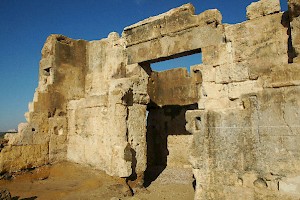
The visit to Siwa may also have been meant as a signal to the Egyptian populace. There were two temples in the oasis, built by pharaoh Amasis (570-526) and pharaoh Nectanebo II (360-343). Amasis was the last ruler of independent Egypt before the Persian king Cambyses had subjected the country. His reign was remembered as a golden age and he was still very much alive in popular tales. Nectanebo had been king after Egypt had rewon its independence, but was defeated by the Persian king Artaxerxes III Ochus and had fled. By visiting Siwa, Alexander claimed to be a "returned Nectanebo", inaugurating a second golden age.
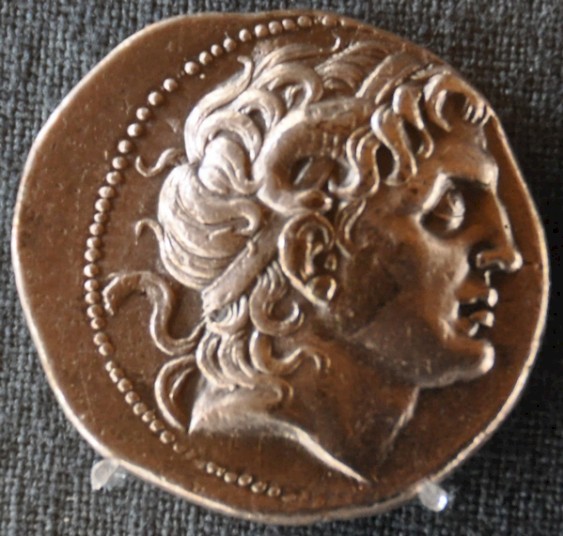
Alexander visited the oracle, asked his questions and received information. It is not known what was discussed, but it is certain that after the visit, Alexander started to worship Ammon. He also wanted to be called "son of Zeus" or "son of Ammon", which amounts to the same. Already in Antiquity, people thought that the oracle told Alexander that he was Zeus' son, but this is speculation. Besides, the hypothesis is unnecessary, because Alexander was already regarded as the son of the supreme god: since his visit to Heliopolis and Memphis, he was the son of Ra, which could and was translated as "son of Zeus".
Return
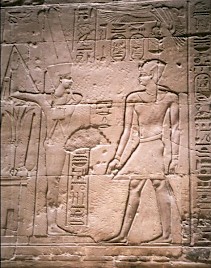
Alexander returned and almost immediately after his arrival in Memphis in April, he received word that the Greek oracles at Didyma and Erythrae had confirmed that Alexander was the son of Zeus. (The timing proves that the Macedonian was already using the title before he went to Siwa.) Nobody in Greece can have been surprised by the claim - it was unusual but not without precedent. Some twelve years before, the ruler of Syracuse, Dionysius II, had had a statue erected on which one could read that he was the son of Apollo. A generation earlier, Dionysius I had tried to suggest a divine descent by wearing Persian vestments, in the mistaken belief that the Persian king was considered divine.
It was probably during his second stay at Memphis that Alexander ordered his court historian Callisthenes of Olynthus, a nephew of Alexander's teacher Aristotle of Stagira, to go to Kush (that is: modern Sudan), probably on a diplomatic mission. Some results of his voyage can be found in Aristotle's books: the philosopher states that the causes of the Nile floods were, thanks to a Greek visitor who had witnessed the summer rains in Nubia, no longer a mystery.
In Memphis, Alexander got the news that the inhabitants of Samaria had revolted. He understood that he had to return to Asia. His Egyptian holiday was over.